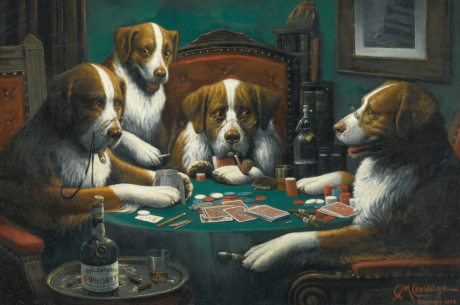Staring Into The Abyss

I went into the viewing of "High Roller: The Story Of Stu Ungar" with a great deal of trepidation. Ungar, considered one of the greatest poker players, if not card player in general, of all-time, is not the first person that you would consider for a biographical movie on. Many would rather see the story of Doyle Brunson's life, which is on tap. Poker players, and people overall, would be remiss not to view Stu Ungar's story as well.
Ungar, one of only two people to win three World Series of Poker Main Event World Championships, was a man beset by a multitude of problems. Cards, however, were not one of them. The movie walks us through his life and the pitfalls of it. Ungar is played by Michael Imperioli, who captured Stu's look and attitude excellently. It is told in a somewhat narrative style, as Imperioli sits in a hotel room discussing his life with a shadowy figure in a chair.
The film starts with a young Stuey, beaten by bullies and generally not respected, being entranced with the lifestyle of the people who frequent his father's nightclub. The politicians, the actors, the gangsters...all were held in high regard to the young man, and he tried to find a way to always be a part of that life. He found it in his ability to play cards. With his father's initial blessing, Stuey begins the fleecing of the average card playing rube, taking money through the game of gin rummy. It draws the attention of many, including a (never stated) gangster by the name of Vince, played by Michael Nouri in superlative fashion.
Early on, we see the seeds that would eventually lead to the downfall of Stu Ungar. Soon after his Bah Mitzvah, the teenage Ungar loses all his gifted money at the racetrack. Infuriated, his father forbids him to play cards again. Of course, Stu doesn't listen and hooks up with Vince to continue his lucrative card playing career. He learns of his father's death while at the gin rummy table. At this point, Vince becomes almost a surrogate father as he takes care of Stu in the card games, making money for the Ungar family devoid of a father figure.
The movie picks up speed as we move later into Ungar's teenage years. He still plays cards, and does extremely well, but his other vices begin to catch up with him. The horses, the prostitutes that he frequents, and other losing options force him into allying himself with Vince's mob boss, who covers his debts and gives him the warning to not gamble with "the other family's" money. Stu, once again, doesn't listen and racks up a huge debt that results in forcing him out of New York (and away from his girlfriend) to the glitter of Las Vegas and the gin circuit.
He wins the first gin tournament he enters, settling his score in New York, and continues on to win his first World Series title when Vince dies. He hurries back to the Big Apple and seemingly settles all accounts there, including his ex-girlfriend who goes on to become his wife.
He defends his title the next year, a daughter comes, and life seems good for Ungar. Soon, however, it all unravels as he descends into a lifestyle of prostitutes, drugs and gambling outside of the thing he was best at, poker.
We are encouraged as, with the assistance of a fellow player named "D. J." (it would be interesting to know who this character was based on), Stu cleans himself up, gets his situation right with his daughter and now ex-wife, and returns to win his third WSOP World Championship, sixteen years after his back-to-back titles. The movie ends, unfortunately, without the final triumph of a great life; it ends with his death, alone in a hotel room in 1998 at the age of forty five.
The movie is not bright and bubbly. It shows the demons that chased Stu Ungar throughout his life and his inability to control them. It showed how he always wanted to be the best, be it at the poker or gin rummy table or in other avenues that were not his forte. It also showed the possibilities that exist in all of us, just as the possibilities exist in all of us to have a life such as Brunson.
Nietzsche one said, "He who fights with monsters might take care, lest he thereby become a monster himself. And if you gaze for long into an abyss, the abyss gazes also into you." This quotation is never more true, or more applicable, than in the life of Stu Ungar. I found myself shedding a tear at the end, not just for the celebration of Ungar's success but for the display of a human's battles within himself. I also shed the tear for him missing what would have been a phenomenal life. The movie displays the best and worst of what is inside us all, not just those of us who are poker players. That, in itself, makes "High Roller: The Stu Ungar Story" worthy of watching and remembering.








